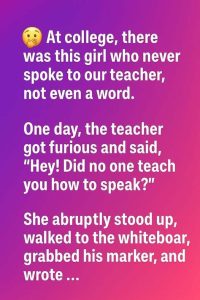There was a girl in college who never talked to our teacher. Not once. She always sat in the first row, completely still, with her notebook open and her writing precise and careful. She always turned in her work on time, and when someone asked her a question, she would either smile or look down. Most of us thought she was shy, like one of those quiet students who liked to stay out of the way.
But one morning, during a heated class discussion, our lecturer got really angry. “Doesn’t anyone have an opinion?” he inquired as he looked around the room. He looked at her. “Hey, you—you’re here every day and always listening.” Don’t just sit there like a rock. Did no one ever show you how to talk?

The room was quiet. The ancient ceiling fan’s hum even seemed to stop.
She didn’t move. Instead, she gently got up, moved to the whiteboard, and picked up the marker. The teacher didn’t seem to understand. She started to write in neat, even strokes without saying a word.
“I lost my voice in an accident two years ago.” But that doesn’t mean I don’t have something to say.
As she underlined the last sentence, the marker made a noise. No one moved for a second. The room was unusually quiet, and the air felt heavy. It was the kind of silence that made you feel every heartbeat.
The teacher’s expression changed. His harsh look turned into one of deep sadness. “I’m so sorry,” he said in a low voice. But she wasn’t finished. She scribbled again on the board:
“Not many people ask.” They just think.
That one sentence impacted us harder than any lecture we’d ever heard.
Everything changed after that day. The teacher apologized again, this time in front of everyone, and began changing his lessons to include written prompts and gestures so that she could join in. He left an additional marker on her desk in case she wanted to add her ideas to the conversation. A handful of us started learning basic sign language after class because we wanted to be able to converse with her without using sound.
Something wonderful happened in our classroom. Yes, it got quieter, but not in a terrible manner. People began to pay more attention—really pay attention. We waited for each other to say what we were thinking. We stopped cutting each other off. We learned to be more patient, more kind, and more aware of how much we could express without speaking a word.
She became one of the most respected students in our program as time went on. Her written thoughts were deep and poetic, and she had a lot of empathy. She told us to consider things in a new way and to realize that quiet isn’t always empty; it can also be power in its purest form.
Before leaving for the last time, she wrote a note on the whiteboard. It said:
“Thanks for listening.” It signifies more than you think.
That message was not deleted. It stayed there until the end of the semester, dim and fading, but still there to remind us every day that words don’t necessarily have to be said to be heard.
Years later, I still recall her. She never spoke a word, but she taught an entire class what genuine communication is. She told us that compassion starts where assumption ends and that sometimes the quietest person has the greatest echo.
True voice doesn’t come from sound; it comes from being brave.
